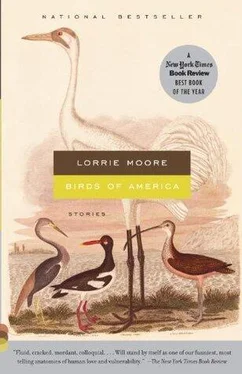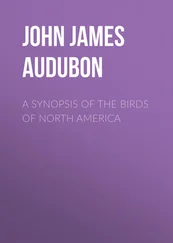“Whatever happened to clams casino?” asks Mack. “I used to get those in Kentucky. Those were great.”
“Shellfish from a landlocked place? Never a great idea, my dear,” says Quilty. “Stick with Nawlins. A city no longer known for its prostitutes quickly becomes known for its excellent food. Think about it. There’s Paris. There’s here. A city currently known for its prostitutes — Las Vegas, Amsterdam, Washington, D.C. — is seldom a good food city.”
“You should write a travel book.” Was Mack being sarcastic? Mack himself couldn’t say.
“That’s what Dating My Sofa was going to be. A kind of armchair travel book. For the blind.”
“I thought Dating My Sofa was going to be a novel.”
“Before it was a novel, it was going to be a travel book.”
They leave behind the wrought-iron cornstalk fence of their little inn for a walk through the Quarter. Soon they are at the wharf, and with little else to do, they step aboard a glittering paddle wheeler for a Plantation River cruise. Quilty trips on a slightly raised plank on the ramp. “You know, I find this city neither big nor easy,” he says. The tour is supposed to be beer and sun and a little jazz band, but there is also a stop at Chalmette, the site of the Battle of New Orleans, so that people can get off and traipse through the cemetery.
Mack takes Quilty to a seat in the sun, then sits beside him. Guapo lifts his head and smells the swampy air. “No more cemeteries,” says Mack, and Quilty readily agrees, though Mack also wonders whether, when they get there, they will be able to resist. It seems hard for them, when presented with all that toothy geometry of stone and bone, not to rush right up and say hi. The two of them are ill-suited to life; no doubt that is it. In feeling peculiar, homeless, cursed, and tired, they have become way too friendly. They no longer have any standards at all.
“All the graves are on stilts here anyway,” says Mack. “The sea level and all.” The calliope starts up and the paddle wheel begins to revolve. Mack tips his head back to rest it against the seat and look at the sky all streaked with stringy clouds, bird blue cracked fuzzily with white. To the right, the clouds have more shape and against the blue look like the figures of a Wedgwood dish. What a fine fucking bowl beneath which they have all been caught and asked to swim out their days! “Look at it this way,” people used to say to Mack. “Things could be worse”—a bumper sticker for a goldfish or a bug. And it wasn’t wrong — it just wasn’t the point.
He falls asleep, and by the time the boat returns to the wharf, ten thousand anesthesiologists have invaded the town. There are buses and crowds. “Uh-oh. Look out. A medical convention,” says Mack to Quilty. “Watch your step.” At a turquoise kiosk near the pier, he spots more missing-children posters. He half-expects to see himself and Quilty posted up there, two more lost boys in America. Instead, there is a heartbreaking nine-year-old named Charlie. There is a three-year-old named Kyle. There is also the same kid from Denny’s up north: Seth, age five.
“Are they cute?” asks Quilty.
“Who?” says Mack.
“All those nice young doctors,” says Quilty. “Are they good-looking?”
“Hell if I know,” says Mack.
“Oh, don’t give me that,” says Quilty. “You forget to whom you are speaking, my dear. I can feel you looking around.”
Mack says nothing for a while. Not until after he’s led Quilty over to a café for some chicory coffee and a beignet, which he feeds pieces of to Guapo. The people at the table next to them, in some kind of morbid theatrical contest, are reading aloud obituaries from the Times-Picayune . “This town’s wacko,” says Mack. Back at the hotel, someone in the next room is playing “The Star-Spangled Banner” on the kazoo.
They speed out the next day — across the incandescent olive milk of the swamps, leafless, burned trees jutting from them like crosses. “You’re going too fast,” says Quilty. “You’re driving like goddamn Sean Penn!” Mack, following no particular route, heads out toward the salt marshes: grebes, blackbirds, sherbet-winged flamingos fly in low over the feathery bulrushes. It is all pretty, in its bleak way. Lone cattle are loose and munching cordgrass amid the oil rigs.
“Which way are we going?”
He suddenly swings north toward Memphis. “North. Memphis.” All he can think of now is getting back.
“What are you thinking of?”
“Nothing.”
“What are you looking at?”
“Nothing. Scenery.”
“Hot bods?”
“Yeah. Just saw a great cow,” says Mack. “And a not-bad possum.”
When they are finally checked into the Peabody Hotel, it is already late afternoon. Their room is a little stuffy and lit in a strange, golden way. Mack flops on the bed.
Quilty, beginning to perspire, takes his jacket off and throws it on the floor. “Y’know: what is wrong with you?” he asks.
“What do you mean, me ? What is wrong with you ?”
“You’re so distracted and weird.”
“We’re traveling. I’m sight-seeing. I’m tired. Sorry if I seem distant.”
“ ‘Sight-seeing.’ That’s nice! How about me? Yoo-hoo!”
Mack sighs. When he goes on the attack like this, Quilty tends to head in five miserable directions at once. He has a brief nervous breakdown and shouts from every shattered corner of it, then afterward pulls himself together and apologizes. It is all a bit familiar. Mack closes his eyes, to sail away from him. He floats off and, trying not to think of Lou, briefly thinks of Annie, though the sudden blood rush that stiffens him pulls at his stitches and snaps him awake. He sits up. He kicks off his shoes and socks and looks at his pickled toes: slugs in a box.
Quilty is cross-legged on the floor, trying to do some deep-breathing exercises. He is trying to get chi to his meridians — or something like that. “You think I don’t know you’re attracted to half the people you see?” Quilty is saying. “You think I’m stupid or something? You don’t think I feel your head turn and your gaze stop everywhere we go?”
“What?”
“You’re too much,” Quilty finally says to Mack.
“ I’m too much? You are! You’re so damn nervous and territorial,” Mack says.
“I have a highly inflamed sense of yard,” says Quilty. He has given up on the exercises. “Blind people do. I don’t want you sticking your hitchhiker’s thumb out over the property line. It’s a betrayal and an eyesore to the community!”
“What community? What are you talking about?”
“All you sighted people are alike. You think we’re Mr. Magoo! You think I’m not as aware as some guy who paints water towers and’s got cysts on his dick?”
Mack shakes his head. He sits up and starts to put his shoes back on. “You really go for the juggler, don’t you?” he says.
“Juggler?” Quilty howls. “ Juggler ? No, obviously, I go for the clowns.”
Mack is puzzled. Quilty’s head is tilted in that hyperalert way that says nothing in the room will get past him. “Juggler,” Mack says. “Isn’t that the word? What is the word?”
“A juggler,” says Quilty, slowly for the jury, “is someone who juggles.”
Mack’s chest tightens around a small emptied space. He feels his own crappy luck returning like a curse. “You don’t even like me, do you?” he says.
“Like you? Is that what you’re really asking?”
“I’m not sure,” says Mack. He looks around the hotel room. Not this, not any room with Quilty in it would ever be his home.
“Let me tell you a story,” says Quilty.
“I don’t like stories,” Mack says.
Читать дальше












